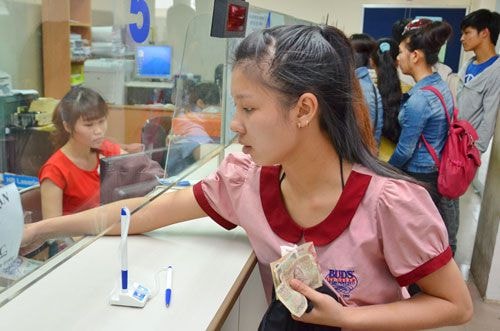Warning of expelling 1,000 students: What needs to be done immediately!
Expelling weak and undisciplined students will contribute significantly to improving training quality and screening human resources.
The fact that 1,041 students from 8 faculties of Tay Nguyen University are at risk of being forced to drop out of school is a rare event in a university in our country, while many schools are struggling to find ways to recruit and attract students to their schools. However, this is something that should be done and encouraged because it contributes significantly to improving the quality of training and screening human resources in our country.
The reason given by the school's Disciplinary Council is that most of these students voluntarily dropped out of school or had a semester average score below 1.0 (on a 4.0 scale). After being warned more than twice and the student fails to improve, the school will force the student to leave school.
 |
| Students pay tuition at Ho Chi Minh City University of Industry. (Illustration photo). |
Just a few years ago, students who passed the university entrance exam, even if they had disciplinary problems or skipped school frequently, were difficult to handle, and few were expelled. People often joked that “it is difficult to get into university, but you can graduate anyway”. That is why some students study for 6-7 years to get a diploma. Eliminating weak students is not a new thing, but in the new conditions and situation, this requirement must be implemented more urgently and thoroughly.
To improve the quality of training and tighten discipline for students, Circular 57/2012/TT - BGDĐT amending the Regulations on regular university and college training under the credit system was issued. Accordingly, from February 10, 2013, after each semester, students will be forced to drop out of school if they are warned of poor academic performance more than 2 times in a row... The warning of poor academic performance is carried out each semester, to help students with poor academic performance know and make appropriate study plans so that they can graduate within the maximum time allowed to study the program.
If Vietnam wants to move towards a high-quality education system, it is necessary to expel 1,000, 2,000 or even more of the weak students right now. In the US, education is highly market-oriented but quality is always the top priority.
Earlier this year, a White Paper on the Expulsion of Chinese Students published by WholeRen Education, a US-based service provider for Chinese students, said that thousands of Chinese students have been expelled. Of the 1,657 students who were expelled, about 57% were dismissed for poor academic performance, while the rest were dismissed for poor academic performance, mental health problems, and other physical problems.
| Illustration photo. |
Returning to the story of our country, in recent years, the quality of human resources at the university and college level has been assessed as not high, not meeting job requirements, even for students graduating from top universities. Where does this situation come from? The input is selected quite carefully, but the learning process at university is "more relaxed" than in high school, so many students do not focus on studying, causing them to gradually fall behind the general level. Or for some reason, such as ability, circumstances... they are "thrown" out of the learning machine.
Tightening training discipline is also a way to have a high-quality labor force. In any environment, there needs to be screening. Those who study poorly, have poor discipline, or drop out of school without permission will of course receive the sentence of “expulsion”. For a long time, university education has been too lenient with students, creating inequality among students and causing long-term consequences. Good, obedient students as well as lazy, disruptive people are eventually recognized as graduates. When they graduate, they take advantage of “relationships and money” to get into good jobs. And that is why the administrative apparatus is cumbersome and ineffective. Now, if we want to streamline it, we cannot do it because we do not know who to reduce.
Tightening training is also a way to reallocate resources. It is impossible to have a "horizontal" training model, where everyone goes to university while their capacity and qualifications do not meet the requirements, only causing waste and waste for families and society. The more screening nets, the better. Maybe the university entrance exam "net" has not selected the right people, then when entering school, there will be another "filter" during the training and graduation exam process. Finally, if the recruitment process into the system of public agencies, enterprises... is carried out equally and publicly, then the efficiency and performance of the public apparatus will certainly be much higher than at present./.
According to VOV.VN


